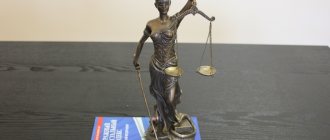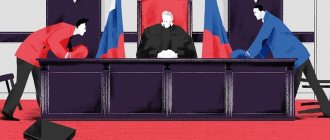Draws: Alisa Koroleva
John Locke's ideas are reflected in many legal systems, including in Russia. Judicial power in the Russian Federation is exercised only by courts represented by judges and jurors and arbitration assessors involved in the administration of justice in the manner prescribed by law. No other bodies or persons have the right to take over the administration of justice.
The provisions on the judicial power and system in Russia are established by the Constitution and the Federal Constitutional Law “On the Judicial System of the Russian Federation”. Advice from a lawyer will help you figure out which court has jurisdiction over your case.
Classification
Judicial system of the Russian Federation (click to enlarge)
This division of courts is territorial in nature. Power is built on the principle of a pyramid.
Greater competence is vested in the highest administrative apparatus (federal courts). The courts of the region, district, and city are subordinate to him and have less powers.
The division can also be carried out according to functional features into:
- federal courts (of general jurisdiction);
- constitutional Court.
constitutional Court
This classification differs in that it separates constitutional proceedings from cases of general jurisdiction.
This court controls how consistent the constitution is:
- international contracts and government agreements;
- principles of republican constitutions and charters;
- Federal Law, government regulations;
- regulatory acts of constituent entities of the Russian Federation and laws.
The federal constitutional law spells out the permitted actions of the Constitutional Court. Competence is abolished only by amending the constitution. The statutory (constitutional) court of the constituent entities extends its power within the borders of the constituent entity of the Russian Federation. Checks the compliance of local legislative documents with the Constitution of the Russian Federation.
Supreme Court
Civil relations, administrative violations, and criminal offenses are supervised by the Armed Forces of the Russian Federation.
Being the highest level in the system, it considers cases already passed by lower regional, city and other courts. This usually occurs for the purpose of supervising the activities of the constituent entities' courts.
However, the Supreme Court can conduct cases from the category of general jurisdiction if they relate to the activities of:
- Higher Examination Commission.
- Central Election Commission of the Russian Federation.
- High Qualification Board of Judges.
- MASS MEDIA.
- Political parties.
- Public associations.
It also has jurisdiction over challenging non-normative and regulatory acts. In addition, it resolves economic disagreements between bodies of constituent entities of the Russian Federation and federal bodies.
- The first instance supervises cases based on the fact of the offense committed.
- The cassation (second) instance monitors the legality of the charges brought by the first instance courts.
- The supervisory authority is permissible when reviewing cases in exceptional cases.
Material on the topic Checking debt by last name in the FSSP: types of debts and methods of verification
One case can be considered simultaneously in both the first and higher instances.
Main job responsibilities of judges.
A judge must conscientiously fulfill his professional duties and be guided in his activities, in addition to the Constitution of the Russian Federation, the Law on the Status of Judges and other legislative acts, generally accepted moral standards, rules of conduct in professional and extra-official activities established by the Code of Judicial Ethics. He is obliged to be impartial, not to allow anyone to influence his professional activities, in the performance of his duties must not show prejudice of a racial, sexual, religious or national nature, and has no right to disclose information received in the performance of his duties.
For violation of the provisions of the Law on the Status of Judges and the Code of Judicial Ethics, a disciplinary sanction may be imposed on a judge in the form of a warning or early termination of the powers of a judge (Article 12.1 of the Law on the Status of Judges).
The decision to impose a disciplinary sanction on a judge, including termination of powers, is made by the QCC. The issue of termination of powers in connection with the commission of a disciplinary offense by a judge may be considered on the basis of:
• representations from the chairman of the relevant or higher court;
• appeals from the body of the judicial community;
• complaints and messages from authorities and officials;
• complaints and messages from citizens.
The procedure and features of consideration of submitted materials by the Committee are established by Art. 21, 22 of the Federal Law of March 14, 2002 No. 30-FZ “On the Bodies of the Judicial Community in the Russian Federation” .
Please note: if there is a question about termination of a judge’s powers in connection with his commission of a disciplinary offense or additional information is required, then consideration of the judge’s application for termination of his powers on other grounds is suspended until consideration of the merits of this issue.
A decision made by the QCC of constituent entities of the Russian Federation can be appealed in court or to the High Qualification Board of Judges of the Russian Federation (HQCC). Decisions of the Higher Qualification Court of the Russian Federation and the Judicial Judicial Judicial Presence on the suspension or termination of the powers of judges or bringing them to disciplinary liability can be appealed to the Disciplinary Judicial Presence.
For information: the disciplinary judicial presence is a judicial body that considers cases on complaints against decisions of the High Qualification Commission of the Russian Federation and the Qualification Court of the constituent entities of the Russian Federation on the early termination of the powers of judges for committing disciplinary offenses (hereinafter referred to as a complaint) and appeals against decisions of the High Qualification Commission of the Russian Federation and the Qualification Court of the constituent entities of the Russian Federation on the refusal to early termination of the powers of judges for committing disciplinary offenses (Article 1 of the Federal Constitutional Law of November 9, 2009 No. 4-FKZ “On the Disciplinary Judicial Presence”). If within a year after the imposition of a disciplinary sanction the judge has not committed a new disciplinary offense, then he is considered not to have been subject to disciplinary liability.
Separately, we note that Art. 8.1 of the Law on the Status of Judges provides for disciplinary liability for the failure of a judge to provide information about his income, about property owned by him and property obligations, as well as information about the income of his spouse and minor children, about property owned by him by right property, and their property obligations.
Since judges of arbitration courts have qualification ranks (classes), they must undergo qualification certification. Thus, a judge appointed to the position for the first time undergoes professional retraining in educational institutions of higher professional and additional professional education. The total duration of such retraining cannot exceed six months, and this period is included in the length of service as a judge. Based on the results of professional retraining, a federal court judge appointed for the first time to the position of judge is assigned a qualification class. In addition, as necessary (but at least once every three years), judges improve their qualifications. The procedure, timing and forms of this procedure are determined by YOU.
Please note: judges have the right to engage in teaching, scientific and other creative activities, the exercise of which should not interfere with the performance of the duties of a judge and cannot serve as a valid reason for absence from a meeting, unless the chairman of the relevant court has given his consent (Article 3 of the Law on the Status of Judges ).
Arbitration courts
Supreme Arbitration Court (SAC)
Regulates disputes in economic relations between legal entities.
individuals and individual entrepreneurs, federal units and constituent entities of the Russian Federation. Since he is in the highest echelon, he controls the activities of the subordinate courts of the subjects. YOUR competencies include:
- Upholding the interests of citizens engaged in entrepreneurial activities.
- Restoring the rights of organizations and citizens conducting economic activities.
- Protection from possible attacks on the economic rights of citizens.
- Regulation of economic processes.
Considers economic disagreements of an administrative and civil nature. Civil economic disputes include:
- about disagreements regarding the concluded agreement;
- about changes to clauses of the contract or its termination;
- about non-compliance with the obligations of the parties;
- on the decision to assign property rights;
- about property disputes.
Administrative disputes:
- challenging regulations regarding an entrepreneur;
- administrative offenses on the part of individual entrepreneurs or legal entities. Faces;
- on the collection of debts, penalties, taxes from an organization conducting economic activity.
Arbitration also deals with bankrupt and insolvent organizations.
Federal Arbitration and Appeal Courts
Conducts economic affairs that have passed through lower authorities without the desired result.
New circumstances that have arisen are considered here.
Rules over the federal court of appeal and arbitration of the constituent entities of the Russian Federation.
He examines cases a second time in case of disagreement in the case.
This occurs when one of the parties disagrees with a decision made in a federal or regional arbitration court.
Then an application for reconsideration of the case is filed. With the help of additional information not previously known to the court, the case may take a different outcome.
Requirements for a candidate for the position of judge.
As already mentioned, a judge is a person constitutionally empowered to administer justice and performs his duties on a professional basis. A judge can be a citizen of the Russian Federation who has reached a certain age (25 years - for a judge of an arbitration court of a constituent entity of the Russian Federation, 30 years - for a federal arbitration court of a district and a federal court of appeal, 35 years - for YOU):
• having a higher legal education;
• having work experience in the legal profession (at least five years for a judge of an arbitration court of a constituent entity of the Russian Federation, at least seven years for a judge of a federal arbitration court of a district, at least ten years for a judge of the Supreme Arbitration Court);
• does not have or did not have a criminal record or criminal prosecution against whom was terminated on rehabilitative grounds;
• not recognized by the court as incompetent or partially capable;
• not registered with a drug treatment or psychoneurological clinic in connection with treatment for alcoholism, drug addiction, substance abuse, chronic and protracted mental disorders;
• does not have other diseases that prevent the exercise of the powers of a judge (Article 4 of the Law on the Status of Judges).
The legal experience of a candidate for judge includes the following periods:
1. Time spent in government positions in the Russian Federation that require higher legal education, government positions in constituent entities of the Russian Federation, civil service positions, municipal positions, positions in state bodies of the USSR, union republics of the USSR, RSFSR and the Russian Federation that existed before the adoption of the Constitution of the Russian Federation (clause 5 of article 4 Law on the Status of Judges).
2. Time spent in positions requiring legal education in the bodies of the Judicial Department under the Supreme Arbitration Court, in legal services of organizations regardless of organizational and legal forms and forms of ownership, in research institutes and other research institutions; as a teacher of legal disciplines in institutions of secondary vocational, higher vocational and postgraduate professional education, as well as time working as a lawyer and notary (Article 1 of the Federal Law of December 15, 2001 No. 169-FZ “On Amendments and Additions to the Law of the Russian Federation “On the status of judges in the Russian Federation”).
3. Work in other positions, if it is directly related to the protection of the rights and legitimate interests of citizens and legal entities, strengthening the rule of law and order, requires knowledge in any branches of law and the ability to apply them in practice (Instructions on the procedure for determining work experience in legal professions for candidates for positions of judges of federal courts, approved by the Ministry of Justice No. 10 (35)-5, Supreme Court, Supreme Arbitration Court 12/27/1996).
Work experience in the legal profession is confirmed by entries in the work book, but if necessary, it can be confirmed by an order of appointment to a position, job descriptions or other documents containing information about the nature of the work performed or previously performed.
Please note: in controversial cases, the final decision on determining the length of service in the legal profession is made by the Qualification Board of Judges. It considers the candidate’s application for recommendation for the position of judge and issues an opinion in which it provides the reasons for the decision.
Arbitration court
A commercial organization based on an arbitration court that resolves economic disputes between civil and legal entities and legal entities among themselves.
The parties who decide to resort to the help of an arbitrator sign an agreement to transfer the case to this authority. Entrepreneurs turn to this organization for a faster resolution of a dispute; in addition, the parties themselves choose a proven judge whom they trust.
Material on the topic Cassation appeal in a criminal case: deadlines for filing
Arbitration courts are:
- convened by the parties to resolve a private case;
- formed on a permanent basis to resolve any conflicts that arise between two economic entities.
Despite the commercial basis, the arbitration court has the right to hear any cases:
- civil;
- economic disputes;
- make decisions regarding conflict resolution.
If one party disagrees with the decision made, the case goes to the arbitration court at the location of the arbitration court.
Magistrates
Closest to the people.
Engaged in regulating public relations. Usually, cases go through this authority first. The justice of the peace belongs to the courts of districts and cities, standing at the beginning of the judicial system.
The legislative body of a particular subject of the Russian Federation appoints a justice of the peace to the post, or he is elected through local voting.
The following requirements are imposed on the candidate:
- Diploma of higher legal education.
- Age at least 25 years.
- 5 or more years of experience.
- Does not conduct parliamentary activities.
- Not registered as an individual entrepreneur.
A judge can hold office for 5 years. At the end of his service period, he has the right to re-apply. You can perform judicial service for no more than 70 years. During the period of service, the judge hears cases:
- Criminal, with a punishment of no more than three years in prison.
- About divorce, if the parties do not disagree about who the children will stay with.
- On the division of property jointly acquired during marriage.
- Other cases of family disputes (except cases concerning parental rights).
- About the relationship between employer and employee.
- On property relations between citizens of the Russian Federation.
Courts of general jurisdiction
Courts of general jurisdiction include: the supreme courts of the republics within the Russian Federation, regional, regional courts, the court of the autonomous region, autonomous districts, Moscow, St. Petersburg and Sevastopol city courts, district (city) courts, and the system of military courts.
They carry out criminal, civil, administrative. In 2017, a portal for courts of general jurisdiction was launched in Moscow, located at https://mos-gorsud.ru/. This resource is designed to combine, centralize and synchronize data on the work of 36 Moscow courts (35 district courts and the Moscow City Court).
The portal contains 6 main sections: “Courts of general jurisdiction”, “Search for court cases”, “Electronic reception”, “Territorial jurisdiction”, “State duty calculator” and “Personal account”, and several additional ones (“News about the work of the courts”, “Infographics”, etc.).
The district court is the main link of the courts of general jurisdiction, which hears cases in the first instance and in the appellate instance in relation to magistrates. He is the directly superior court in relation to the justices of the peace operating in the territory of the corresponding judicial district. Considers more complex cases than magistrates.
Magistrates' courts have limited jurisdiction and hear minor cases using a simplified procedure.
In accordance with the Federal Law “On Magistrates in the Russian Federation”, the magistrate considers at first instance:
- criminal cases of crimes for which the maximum penalty does not exceed three years of imprisonment;
- cases of issuing a court order;
- cases of divorce, if there is no dispute between the spouses about children;
- cases of division of jointly acquired property between spouses with a claim price not exceeding fifty thousand rubles;
- other cases arising from family law relations, with the exception of cases of challenging paternity (maternity), establishing paternity, deprivation of parental rights, limiting parental rights, adoption of a child, other cases of disputes about children and cases of recognition the marriage is invalid;
- cases on property disputes, with the exception of cases on inheritance of property and cases arising from relations on the creation and use of results of intellectual activity, with the cost of the claim not exceeding fifty thousand rubles;
- cases to determine the procedure for using property.
Military (naval) district courts are courts of the Russian Federation operating in the Armed Forces of the Russian Federation, included in the unified judicial system of the Russian Federation, carrying out the tasks of justice. Previously called military tribunals. The military court system consists of the military collegium of the Supreme Court of Russia (the highest level); military court of the Armed Forces, districts, groups of forces; military vessels of armies, formations, flotillas, garrisons (first link).
Military courts
A separate layer in the judicial sphere, because
supervises affairs only in the military sphere. It is territorial in nature and is formed in army locations. The Military Collegium serves as the highest body here. The courts of military districts and groups of troops form the middle link. Regulates the relations of the Armed Forces of the Russian Federation, namely:
- Protects the rights and freedoms of military personnel who have been subjected to unlawful actions by military commanders.
- Criminal offenses committed by military personnel.
- Administrative matters regarding military personnel.
- Cases regarding compensation for violated rights.
- Appealing dismissals from a military position in case of illegality of the decision.
- Disciplinary offences.
Material on the topic Vindication claim - what is it
Division of judges by area of activity
The main classification divides judges by status level and types of courts in which specialists work. But there is another table, it divides lawyers by the nature of the cases they handle. Depending on their number, the staff of the district court, and their qualifications, they can work in one or more of three areas.
- Territorial issues. The lawyer considers only applications from one region (geographical division).
- The functional block of work involves participation in court hearings of a strictly limited nature: only administrative, criminal, and civil cases.
- Personal work consists of considering complaints from the public and conducting personal consultations.
More often, a functional system of separating activities is used, when one employee is engaged in a specific profile - civil, criminal cases, etc.
Judges
A judge is an official who administers justice on behalf of the state. The activities of judges in Russia are regulated by the constitution. The judge does not depend on anyone and makes decisions only in accordance with the law.
A candidate for the post of judge is required to:
- Citizenship of the Russian Federation.
- Must not be found to have violated the law or have criminal offenses.
- A foreign citizen or a citizen of the Russian Federation with a residence permit abroad is not allowed to hold the position.
- Must be legally competent.
- Should not be seen in clinics treating drug addicts, alcoholics, or mental disorders.
Age and experience are also integral criteria for the role of judge. A person under 25 years of age cannot become a judge. The minimum experience as a lawyer is 5 years to obtain the post of judge in the constituent entities of the Russian Federation.
A candidate for the post of judge is selected through a competitive process. To do this, the future judge applies to the examination commission to assign him the qualifications corresponding to the position. It is important to have a law degree, the necessary experience, and reach a satisfactory age.
If all requirements are met, a list of required documents is attached to the application. The examination committee cannot interfere with passing the exam if all the rules are followed. When the exam passes with a positive result, the candidate can submit an application to the qualification commission to recommend him for the position.
Thus, the judicial system of the Russian Federation has a clear classification according to functional responsibilities. Each case is considered according to its specialty and within the competence of the court. Any citizen of Russia can receive the necessary assistance in civil, family, and administrative relations.
About the judicial system of the Russian Federation, watch the following video:
Status of a judge in the Russian Federation
3. Basic rights and responsibilities of judges, court employees, as well as the court administrator 3.1.
A judge, court employee, court administrator have the right to: - work that meets professional training and qualifications; — production and social conditions that ensure safety and compliance with occupational hygiene requirements; — professional retraining and advanced training; — labor protection; — wages in the amount established by current legislation, as well as bonuses based on work results; — rest, which is ensured by the provision of weekly days off, holidays, non-working days and paid annual leave; — social insurance benefits, social security by age, as well as in other cases provided for by law; — leave without pay in accordance with current legislation; - compensation for damage caused to his health and property in connection with the performance of official duties; - direct appeal (in the prescribed manner) to the chairman of the court and his deputies.
3.2. A judge, court employee, court administrator are obliged
: - ensure compliance with the Constitution of the Russian Federation, normative legal acts of the Russian Federation, orders, instructions, instructions and instructions of the chairman of the court and his deputies, heads of structural divisions of the court, issued within the powers granted to them;
- present documents when applying for a job, provide personal information required by law, and also inform about all changes that have occurred in the requested information, in particular about changes in address, marital status, etc., within the time limits established in court; — maintain the level of qualifications necessary for the effective performance of their duties; — observe labor discipline, as well as the internal rules of the court; - use working time for productive work; — take measures to eliminate the causes that disrupt the normal course of work and immediately report the incident to the immediate supervisor; - treat office equipment and other court property with care, maintain cleanliness in the workplace, follow the established procedure for storing material assets and documents; — refrain from actions that prevent other employees from performing their official (labor) duties; - show politeness, respect, tolerance; - have a neat appearance; - use consumables and other material resources sparingly, and also prevent long-distance and local telephone conversations not caused by business needs; - before going on vacation or going on a business trip, leave office equipment and other material assets at his disposal in proper form, transfer outstanding documents to a superior manager to make a decision on assigning them to another contractor, and in the event of termination of the employment contract or termination of authority (exit resign), in addition, return the service ID (pass) to the personnel service, the judge - in the manner prescribed by law; — in case of absence from the workplace, take measures to notify the immediate supervisor; - keep state and other secrets protected by law, and also not disclose information that has become known to him in connection with the performance of official duties and affecting the private life of citizens; — refrain from public statements, judgments and assessments regarding the activities of government bodies, as well as their leaders; — comply with the requirements of these Rules, job and other instructions, as well as the established procedure for working with official documents. 3.3.
A judge, court employee, or court administrator is prohibited from: - removing property, documents, objects or materials belonging to the court from the court building without the appropriate permission; - bring explosive, poisonous and flammable substances into the courthouse, as well as objects or goods intended for sale, use non-standard electrical appliances and heaters; - post advertisements outside designated areas without appropriate permission; - perform work at the workplace that is not related to the performance of official duties; - form structures of political parties and public associations (with the exception of trade unions) in court, use your official position in their interests; — commit acts (actions or inactions) that could damage one’s reputation, the reputation of the court, the judicial system or the judicial community; - smoke in places not specially equipped or designated for smoking tobacco; - be in the court premises in a state of alcoholic, narcotic or toxic intoxication.






